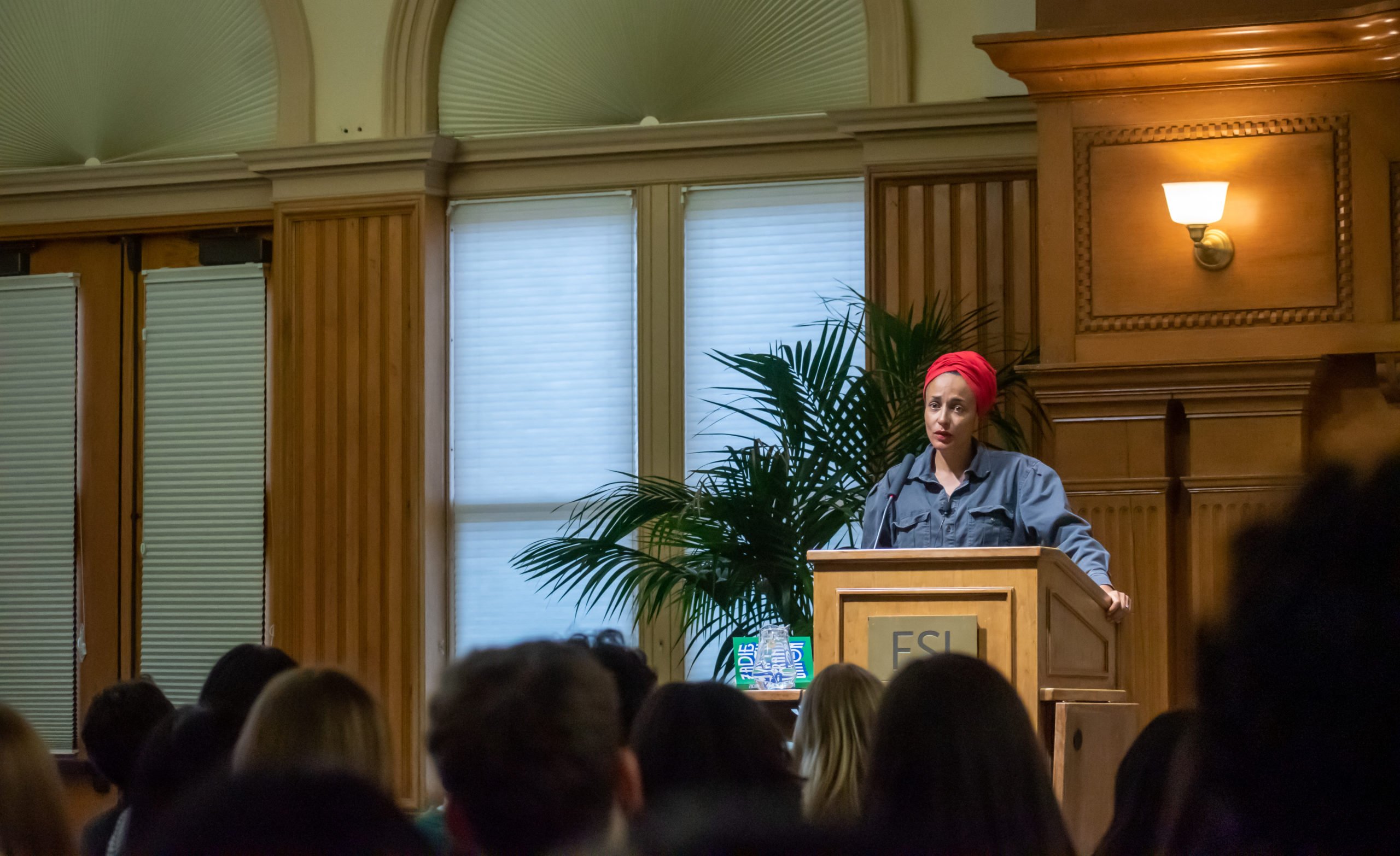“Why don’t you just do your degree and chill out?” said Zadie Smith, offering a striking piece of advice to an anxious room of aspiring writers and literary enthusiasts. The quip encapsulates the dry humor and brutal honesty that defined Smith’s reading and Q&A session on Monday afternoon. The event was part of the Lane Lecture Series, which is hosted by the Creative Writing Department.
Currently a creative writing professor at New York University, Smith is a British Jamaican author from London, and she frequently joked about the differences between American and British culture during her talk. She studied English at Cambridge University, and her novels and short stories have earned much critical acclaim, including the Guardian First Book Award, the Orange Prize for Fiction and the James Tait Black Memorial Prize.
Smith spoke of novels as artistic objects that are outside of the writer’s control and open to interpretations. As audience members asked Smith how she crafts arguments in her stories or how she manages readers emotions, Smith consistently emphasized the active role of the reader in defining a story. She explained that she can write a piece with certain intentions, but she believes part of the beauty in literature originates from how her message can come across differently — or even be lost completely — for different readers.
“We are the glitch,” Smith said. “But I like the glitch, I like the miscommunication, and I like the fact that the novel is a different thing for the five people who read it. I want that to happen. I’m not trying to get uniform results. That’s not human.”
The author explained that she was first and foremost a voracious reader, and then later in life became a writer. She described her famed debut novel “White Teeth” as her “English degree in fictional form” because it was so heavily influenced by her reading and studying. While Smith acknowledged that not all writers are readers, she said that her work is defined by her reading: “I’m very pleased to be the child of books.”
Specifically, Smith pointed to West African and Caribbean literature as two of her biggest influences. The writer’s displayed her cutting humor as she mused on originality and narrative voice.
“There is nothing but influence in life, and fiction is made up of influences. There is nothing original in it,” Smith said.
Smith continued to showcase her wit throughout the event. She read the crowd “Sentimental Education,” a short story from her 2019 collection “Grand Union.” The raunchy and honest tale follows Cambridge student Monica as she wrestles with jealousy, becoming obsessed with her lover’s best friend, Leon, who seems to get everything he wants.
The audience chuckled throughout Smith’s reading, drawn in by her unabashed descriptions of physical intimacy and Monica’s comical hypocrisy. Particularly impressive was Smith’s use of realistic dialogue, like that between Monica and her lover Daryl as they debate the pros and cons of patriarchy versus matriarchy.
Perhaps the strength of Smith’s dialogue should not come as a surprise. “I am a dialogue writer,” she told the crowd, explaining that crafting conversations comes naturally to her. She said that sometimes her husband can hear her in her study, talking to herself as she designs dialogue.
The laughter didn’t die after Smith’s reading; throughout the Q&A portion of the event, the author got the crowd laughing with her answers. The same humor that was so evident in her writing was also present in her casual conversation. Smith said that she got some of her sense of humor from her father, who “laughed at the darkest things” because of the many difficulties he faced in life.
Part of the humor in “Sentimental Education” originated from Smith’s own experiences at Cambridge. The writer said that it was an incredible culture shock to study at the prestigious institution. She was especially taken aback by the seriousness and ritualistic nature of the school, which she found humorous.
“You guys are probably studying very serious things, but I was studying English literature,” Smith said. “It’s not that serious. There was just something so funny about our action towards it.”
But Smith’s talk was far more than just humorous. She was incredibly honest with the audience, calling out ideas she disagreed with and being straightforward about the difficulties of being an author. For example, when asked if she has a creative process, Smith countered the idea, saying that her writing is much more constrained by logistical limitations than anything else.
“I think if you talk to most women writers with small children, it’s just not like that,” Smith said. “It’s a practical matter. Like, do you have childcare? Is school open?”
Right after the event, Smith had to catch a flight back to England, as her debut play, “The Wife of Willesden,” premiers this week in London. In terms of other current projects, Smith told the audience that she is currently writing a historical novel, set in the 19th century.
Smith’s reading and talk was all the audience could have wanted, full of beautiful writing, honest advice and witty remarks. Hopefully we will be seeing more of her work soon.
“Inspiration is like the last thing I’m waiting for,” Smith said. “I just need time.”
